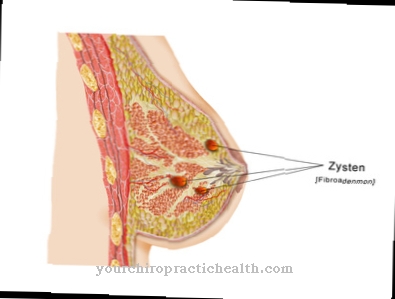Around 20 percent of women experience pain when they sleep with their partner. This Pain during intercourse of the woman can have different causes. Not only are they very uncomfortable for those affected, they can also be the cause of serious illnesses.
What is pain during female intercourse?

Dyspareunia - this is the word used by medicine to describe the pain in women during sexual intercourse. This pain can occur after, during and before sexual intercourse. If the pain occurs during sexual intercourse at the entrance of the vagina and on the labia, it is external pain.
The person affected feels internal pain in the uterus, rectum or ovaries. The pain during sexual intercourse for women can arise when the penis irritates a certain area. An orgasm is often not possible if the woman is painful during sexual intercourse. Every woman perceives the symptoms differently.
Pain during sexual intercourse for the woman may be burning, stabbing, or dull. Other people affected feel itching or cramping. A vaginal spasm (vaginismus) is just one form of dyspareunia. Some pain during sexual intercourse does not occur until the woman has orgasm.
causes
The causes of pain during sexual intercourse in women are varied. Acute or chronic urinary tract infections are common. Inflammation of the fallopian tubes and ovaries are also causative. If the woman experiences pain during sexual intercourse, genital warts, tuberculosis or venereal diseases such as gonorrhea or syphilis should also be considered.
Other causes of pain during sexual intercourse for women can be malformations or scars after childbirth. Reactions to chemical contraceptives are also becoming more common.
A too dry vagina can also play a role.Sometimes a physical cause of pain during sexual intercourse cannot be found either. Then stress or emotional conflicts should be considered. Pain during sex can also occur during defloration, i.e. the first time.
Internal cramping during sexual intercourse, which can often occur due to high expectations or aversion to the partner, sometimes lead to painful sensations.
Diseases with this symptom
- Vaginal cramp
- Vaginal inflammation
- Vulvitis
- Genital warts
- gonorrhea
- Inflammation of the fallopian tubes and ovaries
- tuberculosis
- syphilis
- Vaginal fungus
diagnosis
Recurring pain during sexual intercourse must be clarified. After a conversation, the gynecologist examines the person concerned. A smear is used to search for suspicious pathogens. An ultrasound scan should rule out physical causes.
If no cause for the pain in the woman's sexual intercourse can be found, further examinations (urine, blood, tissue sample) are pending. Since the psyche can always play a role in pain during sexual intercourse, the doctor also takes care of this aspect in an intensive conversation.
It is important not to be silent out of shame. Investigating the cause should be started quickly. So that the pain does not become independent during sexual intercourse. Once the cause and correct therapy have been found, the prognosis for the progression of the pain during sexual intercourse is very favorable.
Complications
Pain during sexual intercourse in women can have a wide variety of causes, which can be associated with a wide variety of complications. An example of this is a vaginal fungus (vaginal mycosis). This normally heals again without complications, but occurs again and again, especially in people with weakened immune systems. It is also characterized by severe itching.
In the rarest of cases, the fungus can penetrate deeper layers of the skin and get into the bloodstream. This allows the pathogen to spread systemically and damage the entire body, causing sepsis. This can degenerate into septic shock and lead to multiple organ failure.
Ovarian cysts (ovarian cysts) also cause severe pain during sexual intercourse. If these can burst, these blood vessels can be affected, causing profuse internal bleeding. This should be treated surgically immediately. The ovary can rarely rotate on its own axis.
This cuts off the blood supply to the ovaries, which can lead to dizziness and menstrual disorders. In the rarest of cases, an ovarian cyst can degenerate into ovarian cancer (ovarian carcinoma). Endometriosis can lead to bleeding, which can irritate the surrounding tissue. Scarring can also occur in these areas. One of the most common consequences of endometriosis is female sterility (infertility).
When should you go to the doctor?
Pain during sexual intercourse in women is normal during the first sexual intercourse and is not a reason for a doctor's visit unless it makes it impossible. If, on the other hand, it is not possible to insert the penis into the vagina even after several attempts, the affected woman should see a doctor, because she may suffer from disorders such as vaginismus or an excessively developed hymen caused by a small incision must be removed.
If pain occurs during sexual intercourse in a woman who is already sexually active, it is a case for the doctor if it is observed repeatedly or if it becomes more intense. It may just be because of the pose, which can easily be found out by the couple adopting a different pose. Burning, pulling or tearing pain, on the other hand, indicates an infection of the genital organs or a sexually transmitted disease. Only a gynecologist can make the diagnosis. With the right treatment, the pain during intercourse will go away quickly.
If a venereal disease is out of the question, but pain still occurs, a change in the internal genital organs may be behind it. An examination at the gynecologist brings clarity. This is especially true if the symptoms occur in connection with bleeding or occur for the first time after an event such as childbirth or an operation.
Doctors & therapists in your area
Treatment & Therapy
Treatment or research into the cause of the pain in women during sexual intercourse should definitely be carried out. Otherwise it can happen that intimacies are increasingly avoided or at some point completely stopped. Especially since the cycle of expecting pain has to be broken.
If the woman experiences pain during sexual intercourse, the gynecologist should be consulted first. Once the cause of the pain during intercourse has been found, individual treatment can begin. If chemical contraceptives cause pain, they should be avoided. A lubricant that is available in pharmacies or drugstores can help if the vagina is too dry.
If inflammation is the cause of pain during sexual intercourse, an antibiotic can help. Genital warts can be removed. Sometimes a change of position helps if the woman experiences pain in only one particular position during sexual intercourse.
Exercising the pelvic floor muscles can be supportive. You should also think about learning a relaxation technique (yoga, autogenic training).
Outlook & forecast
The prognosis for pain during intercourse in women depends on the causes. In women who are already through the menopause, the body often no longer produces enough vaginal secretions. This problem can be circumvented by using lubricating gels that perform the same function during intercourse as natural vaginal secretions. In young women, a lack of sexual stimulation is usually the cause of painful intercourse resulting from a too dry vagina. This problem can also be solved with stimulating foreplay.
Fungal infections often lead to burning pain in the genital area, which makes sexual intercourse impossible. In this case, the underlying disease must first be treated. For this purpose, antimycotics are available in the form of ointments or suppositories. Therapy usually lasts at least a week. Since the partner is usually also infected, he or she must also be treated, otherwise a recurring mutual infection (poin-pong effect) can be expected.
If the pain during sexual intercourse is due to an acute inflammation of the bladder and the urinary tract, the underlying disease must also be combated.
prevention
Pain during sexual intercourse cannot be specifically avoided. However, it is possible to prevent irritation of the vagina. This includes leaving out soap in the genital area and wearing cotton underwear. Since sexual intercourse can cause pain in the woman's head, the sexual act should only be performed if the woman really wants it.
You can do that yourself
Pain during sexual intercourse in women often, if not always, has an emotional background. Affected women can start by observing exactly when the pain occurs. This often allows indications of the cause. An uncomfortably rubbing, dry feeling indicates vaginal dryness. Pain during penetration suggests a problem with the vaginal muscles, such as vaginismus or emotional anxiety. A burning pain could be an indication of irritated mucous membranes, such as those that occur with a sexually transmitted disease. This observation will later also help the gynecologist with the diagnosis.
If the vagina is dry, a vaginal cream or simple lubricant can be the solution. In mild cases, extra wet condoms can be a solution. It also helps many women to consciously relax or find a way to put aside fears and apprehensions while having intercourse. The more often the pain occurs during sexual intercourse, the more it ultimately becomes a psychological problem, because the woman then expects it and, in addition to the original problem, also stiffens and expects the pain.
During the first sexual intercourse, pain in women is normal, even if it does not occur in all cases and is of varying intensity. In these cases, too, a lot of patience, lubricating cream or wet condoms or a warm bath beforehand, which relaxes and also loosens the vaginal muscles, help.



.jpg)




















.jpg)



